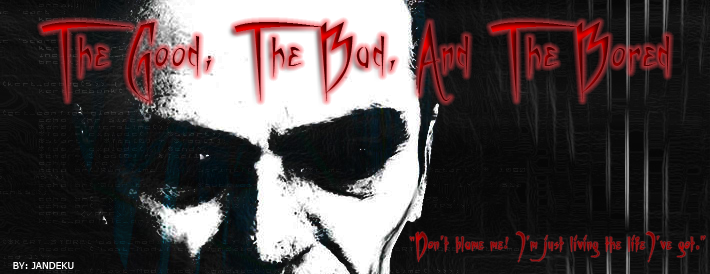So I was checking out a few trailers for Braid (you know - I sometimes do check things I know I'll never have, just to keep in touch with new games coming out. When someone tells me Old Franchise 5 and Final Sci-Fi [Insert Roman Numeral Here] are alike, I wanna know what I'm being told) and when reading a description of the game features, I came across this wonderful expression which I would like to approach for a while.
The expression is "forgiving gameplay".
This, my good people, is a direct copy and paste from Greenhouse's website. "(...) The game doesn’t force you to solve puzzles in order to proceed. If you can’t figure something out, just play onward and return to that puzzle later. (...)" Well then... can you tell me what the point is? As I recall, when you're playing a game - specifically, a puzzle game - you overcome certain obstacles to reach a goal. If you can just ignore a difficult part, play onward and then go back whenever you "feel like it", what's the point of having an obstacle?
It's hard to fit in my brain that I can pick a game already programmed in case I'm a little slow. I understand where they were going with Braid. It's a game made as a critique to the way most games do things, it's social and political metaphor... the problem is, it comes in a time and context in which much of that is lost. This is an era where 2 billion bozos can log onto the same virtual community, find naked mods to their characters and be general douchebags in complete anonymity. This is an era in which whatever puzzles we are faced with during gaming are so one-sided and simple anyone can figure them out. This is not an era when people like to think when playing games, and they seek the simple satisfaction of being able to shoot someone or something without consequences. I see where the creator, Jonathan Blow, was going with this. And I don't criticize Braid in ways other than this one: the story is open to interpretation, the game is aesthetically wonderful and it's a side-scroller like we hadn't seen in years. By the very philosophy behind the game, having anything other than forgiving gameplay would be paradoxical and useless...
Still, I read about the concept in Wikipedia, and the idea still wouldn't fit my brain: you can finish this game without solving most puzzles, so as long as you destroy bosses. In several conferences and intervews, Blow urged gamers not to consult walkthroughs and instead try solving the puzzles themselves. I'm all pro this as well, Blow, in fact unless we are playing a graphical adventure in which it is virtually impossible to make it without a guide (Persona 3, looking right at you), we usually feel much more rewarded for surpassing a difficult part of the game on our own. It makes us feel good, in harder puzzles it makes us feel like flippin' geniuses. And I'll quote Blow himself on this: "(...) unearned rewards are false and meaningless (...)". I absolutely agree - but the fact is that we're in a time when playthroughs are available on YouTube half an hour after a game's release, and further help can be found online. That was before, my good man. When I began gaming, we didn't have guides or Internet... we still finished games. You have made a pearl of a game perhaps, but you are giving it unto people who go by the rules of trying three times and then checking a guide. If there wasn't a token for finishing each puzzle, I can bet you anything most people wouldn't try to finish puzzles at all, and just side-scroll their way to the ending!
Then again, maybe I am wrong. Maybe people will take the challenge, and try to get all tokens, and do something with their brain for a change.
...or maybe not. This is an instant gratification society. This is a place where people will praise you for everything you do - every little thing! You have to either work really bloody hard, or not at all, for your accomplishments, and most people don't have to work hard. Everyone is so afraid of traumatizing their children they keep telling them they're special. So when running freely through the meadow of understanding, it comes as quite a shock to slam face-first into brick wall of reality. If people get praised for very little, they will never try to achieve the very hard. I see this everyday. So yes, this is a good concept and appropriate to the game - but I fear what this innovative feature will do to gameplay as we know it. We'll go from very easy goals to no mandatory goals at all. And if so, what's the point of playing a game?
And then again, maybe I'm blowing this completely out of proportion. I happen to think people could use a little more challenge, a little more of something that would make them think, a little working hard for rewards, a real chance to miss and fail, something that would make those two remaining braincells hump each other and produce thought... or a real chance to get stuck in a game unless they figure it out. It's just a game, after all.
28 May 2009
Subscribe to:
Post Comments (Atom)

2 comments:
Impossivel acabar Persona 3 sem guide?? O jogo é bue linear rapariga,q m lembre n vi o walktrough nem uma vez o.o
Não me estava a referir ao jogo em si, mais às Persona. E daí, talvez seja a minha idiotice inata e aquilo seja mesmo muito simples xD
Post a Comment